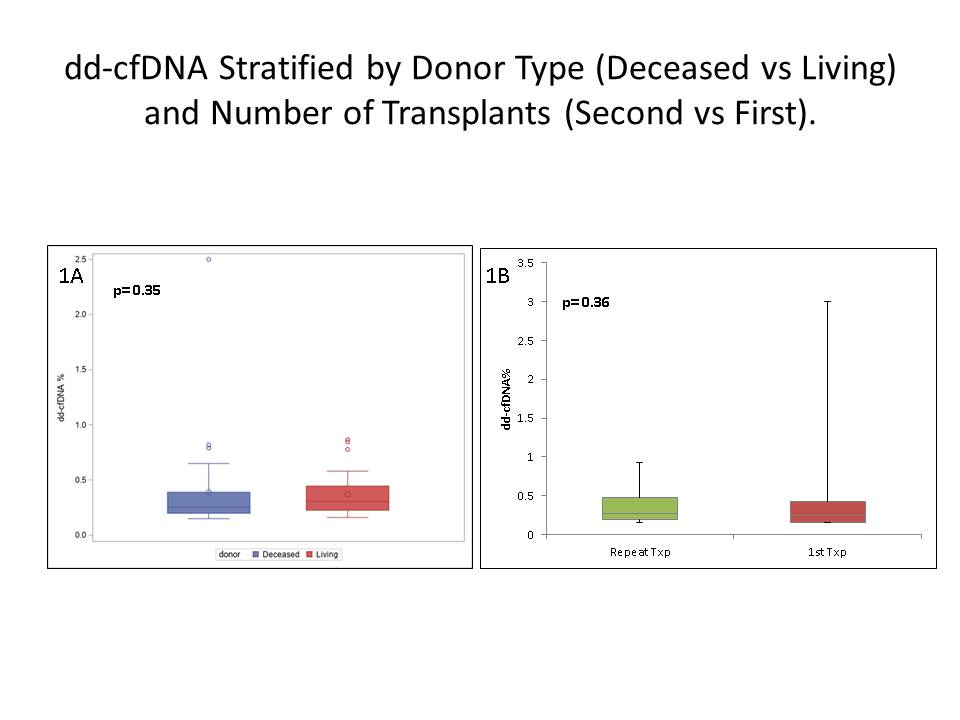Impact of Kidney Transplant Type and Previous Transplant on Baseline Donor-Derived Cell Free DNA
Nephrology and Hypertension, Allegheny General Hospital, Pittsburgh, PA
Meeting: 2020 American Transplant Congress
Abstract number: C-334
Keywords: Allorecognition, Antibodies, Image analysis, Kidney
Session Information
Session Name: Poster Session C: Biomarkers, Immune Assessment and Clinical Outcomes
Session Type: Poster Session
Date: Saturday, May 30, 2020
Session Time: 3:15pm-4:00pm
 Presentation Time: 3:30pm-4:00pm
Presentation Time: 3:30pm-4:00pm
Location: Virtual
*Purpose: Donor derived-cell free DNA (dd-cfDNA) is a biomarker useful in predicting acute rejection in renal allografts. The technology uses next generation sequencing and does not require donor genotyping. It is unclear whether baseline dd-cfDNA levels are affected by the presence of failed previous allograft and whether baseline values differ by type of kidney transplant. We aimed to evaluate whether differences exist in baseline values of dd-cfDNA based on the type of transplant (deceased vs.living donor) and number of transplants (repeat vs.first).
*Methods: We identified patients who underwent kidney transplantation at our institution between April 2018 and June 2019 and had measurements of dd-cfDNA (AlloSure, CareDx, Brisbane, CA) at multiple time points beyond 2 weeks post-transplantation. A dd-cfDNA value ≥1% was considered abnormal and prompted allograft biopsy. If biopsy showed evidence for rejection or other injury,that patient’s dd-cfDNA values were excluded from the analysis since we aimed to compare baseline values. Baseline dd-cfDNA values were compared for patients who had deceased vs. living donor and repeat vs. first-time transplants.
,
*Results: There were 72 patients with first-time kidney transplants and 13 with repeat transplants (with previous kidney still in place) during the study period who had dd-cfDNA measurements.Twelve patients from first-time transplant and 1 patient from repeat transplant groups were excluded from analysis since they had allograft biopsy showing evidence for rejection or other injury. There were 196 measurements of dd-cfDNA among 60 first-time and 44 dd-cfDNA measurements in 12 repeat transplant recipients that were included in the analysis. Among first-time transplants, there were 32 deceased donor (with 112 dd-cfDNA values) and 28 living donor (with 84 dd-cfDNA values)kidney recipients. There were no significant differences in dd-cfDNA values for either deceased vs. living donor (0.39±0.42 vs. 0.37±0.20, p=0.35) or repeat vs. first-time(0.34±0.07 vs. 0.39±0.43, p=0.36) transplant recipients (figure 1).
*Conclusions: Our findings suggest that a previously failed kidney transplant does not significantly affect the baseline dd-cfDNA levels. This may reflect the limited viable cells in a failed allograft capable of generating cfDNA. Baseline dd-cfDNA were unaffected regardless of whether kidney was from a deceased or living donor despite the possibility that kidney from a deceased donor is susceptible to higher level of ongoing injury from factors such as ischemia-re-perfusion and higher degrees of immunological mismatch.
To cite this abstract in AMA style:
Sureshkumar KK, Chopra B. Impact of Kidney Transplant Type and Previous Transplant on Baseline Donor-Derived Cell Free DNA [abstract]. Am J Transplant. 2020; 20 (suppl 3). https://atcmeetingabstracts.com/abstract/impact-of-kidney-transplant-type-and-previous-transplant-on-baseline-donor-derived-cell-free-dna/. Accessed July 2, 2025.« Back to 2020 American Transplant Congress

